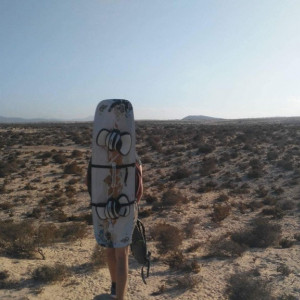Do you have a dedicated space to work?
Interview with Artur, an engineer who found purpose as an Intrapreneur
Plenty!
My fiancee —who also works at Automattic— and I recently bought an apartment, and we have sacrificed one of the rooms to serve as the office. It is furnished with a Herman Miller Embody chair and an Ikea Bekant standing desk. However, in all honesty, I have not yet tried the standing desk.
The biggest enemy of working from home is the fridge. I can hear it calling me to check what is inside. Also, somehow there is always so much to do at home that I get distracted by laundry and other chores.
Since WeWork recently launched in Poland, I also rent a space there. I was pleasantly surprised by the community and the benefits of leaving home. For example, it's somehow easier to hit the gym on the way back home than to leave the house specifically for that reason.
Paying for both a home office and the coworking space is a bit extravagant, but fortunately, Automattic helps pay for the coworking space.
Also — on top of that—we travel for about 100 to 120 days per year. By no means are we approaching nomad territory, but this is a significant amount and has to be taken into account.
For example, I consciously bought an Apple Magic Keyboard for my desk setup, because it has keys similar to the ones on my laptop. That way, switching to laptop-only mode needs no adjustment.
Artur realized entrepreneurship wasn't for him—see how he carves out his creativity and purpose as a remote Intrapreneur at Automattic.
Read full interview from Interview with Artur, an engineer who found purpose as an Intrapreneur.
Interview with Meryl, a digital marketer and master of home office organization
Yes, I have an office with four walls and three doors: one regular door and French doors that see the front door of the house. The office is the perfect size as I can use a portable heater or fan to warm up or cool down without wasting any energy on the rest of the mostly empty house.
Meryl K. Evans is skilled at creating a home office that leads to remote work flexibility. See her advice for creating a successful workspace, and hear about her journey into freelancing.
Read full interview from Interview with Meryl, a digital marketer and master of home office organization.
Interview with Nathan and Connor, owners of Freeeup
We both have dedicated workspaces within our homes where we regularly work and move around from throughout the day.
We both also enjoy getting out and going for walks while taking phone calls. I also tend to move around to different coffee shops in my local area as well when I need to change up the space and get different inspiration for the day.
Thinking of creating your own remote startup? See how Nathan and Connor built a successful and effective remote team from scratch.
Read full interview from Interview with Nathan and Connor, owners of Freeeup.
Interview with Maggie, a senior product manager at HubSpot
Yes, my desk is set up in my bedroom. My husband works remotely too, and he’s in the spare bedroom.
Remote work allows Maggie to live in a small town and excel in her career. Hear about how she stays professionally connected, and her essential career advice for remote workers.
Read full interview from Interview with Maggie, a senior product manager at HubSpot.
Interview with Ben, a web developer who freelances from home
My workspace for the last half a decade has been a desk my father made for me. For a while, this was in it's own room in the apartment I lived in. When I started renting a house with a few friends, I got the master bedroom, and so 1/3 of that became my workspace, and when they moved out, I moved my desk down to the living room, where it's been for the last 3 years.
I've tried a co-working space (didn't like it, too expensive for what it was), working in a coffee shop (do-able with headphones), and even rented a private office space for a year (wasn't worth it, who wants to drive to an office 10 minutes away when you have a computer in your living room? :) ).
Eventually I might take one of the other bedrooms and use it as an office, but the living room works well because my work computer is also my gaming computer.
That all being said, I run a dedicated virtual machine on my computer where I do all my client work. It's a good way to separate all the files I need and makes it a bit easier to secure it all (I deal with sensitive data for some of my clients).
Learn the tips and tricks Ben uses to stay productive while working remotely on a hybrid team
Read full interview from Interview with Ben, a web developer who freelances from home.
Interview with Harry, an IT Architect who works from home
There was a time that I occupied an entire room with a large IKEA desk crowded with monitors, a printer, stacks of papers and trinkets. I slowly realized most of this was just noise (literally) and unnecessary.
Now I have a dedicated work area in the bedroom that's rather minimal with a small writing desk and a chair.
I do most of my work here during the day, but I can also easily unplug my laptop and migrate to somewhere else in the house for a change of scenery without any hassle.
I've also been known to work in exotic locations like the food court at Target while my wife is shopping :)
Harry has worked remotely for almost 10 years as a senior mobile, web and desktop developer—learn how he balances work with family.
Read full interview from Interview with Harry, an IT Architect who works from home.
Interview with Patryk, a Front-end Developer & UI Designer
Yes. I'm renting a desk in a coworking space, where I keep my 25" monitor, external keyboard and mouse.
If I am staying at home, I set up my MacBook on a kitchen table, but having a nice environment in the coworking space helps me getting out and keeping the routine.
Patryk has learned that there is no reason to wait for the flow - once you start working, it will happen naturally.
Read full interview from Interview with Patryk, a Front-end Developer & UI Designer.
Interview with Chanell, a freelance writer and social media manager
I do not have a dedicated space at the moment. So much of my work is done on my laptop, and I do not need any extra equipment such as papers, large monitors, printers, or additional hardware. Therefore, I do not have a need for a significant amount of space.
I usually work on the coffee desk in my living room or basement. It is funny because I created a desk space in my bedroom for this exact thing. Ironically, I am more comfortable elsewhere.
I have worked at coffee shops here in Metro Atlanta, and each experience has been pretty good. I have a friend who also works from home, and we have set up co-working days where we meet up to work at a coffee shop at least once a month.
We use this as an opportunity to try new local coffee spots and catch up while we work.
When I first turned to remote work, I felt a bit isolated and overwhelmed. I did not think I would feel this way, but visiting coffee shops in the beginning really helped. It was comforting to see a lot of other remote workers doing the same thing I was. It helped to settle me down so I could get into my current rhythm.
Now, I do not attend coffee shops as much for two reasons. The first is because the closest coffee shop that is large enough to house remote workers is a bit further than I am willing to drive (I live in the suburbs), and the ones I prefer fill up pretty quickly.
However, I think visiting coffee shops to work are a great alternative, and something I am going to continue to do with my friend.
The second reason is that traffic is not the greatest here (one of the main reasons I left my job) so traveling to a lot of different areas to work defeats one of my original purposes for doing this. As I develop my business further, I do see the value in going to places where other professionals are so I can network.
Chanell is a freelance writer working from Atlanta that writes about business management tips and video game entertainment threads.
Read full interview from Interview with Chanell, a freelance writer and social media manager.
Interview with Cameron, a designer who works remotely at a WordPress agency
I have a dedicated office space in my home but also try to change things up by working from different locations such as a local coffee shop or my outdoor patio which overlooks a wooded area.
I think changing your scenery from time to time can help fuel your creative juices and improve your overall well-being by getting some fresh air.
Learn how Cameron started full-time remote work after trying freelancing and starting a digital agency.
Read full interview from Interview with Cameron, a designer who works remotely at a WordPress agency.
Interview with Jenna, a freelance writer who works remotely to help manage her health
I work almost exclusively from my couch. I know it’s probably terrible for my body, but I end up in so much pain from sitting at a desk. When I worked in an office, we had these ergonomic, high-end chairs that were adjustable in a dozen different ways, but no matter how I sat, I dealt with a lot of pain and repetitive stress injuries.
I have my couch set up so that my back is supported, and I’m not dealing with constant back pain anymore so that’s great. I might have an easier time focusing if I had a dedicated office space, but then I'd end up in pain, so it's worth it for me.
As much as I love the idea of writing in a coffee shop or even a park, I find it way too distracting! I need silence to concentrate, and I'll end up people-watching instead of working.
I used to work in an open office environment that was always noisy and it was incredibly difficult to get things done.
I'm amazed at how much more productive I am when things are quiet and interruption-free.
Jenna started working remotely after realizing her office job was causing health problems—now she works as a freelance writer and writes about self-improvement
Read full interview from Interview with Jenna, a freelance writer who works remotely to help manage her health.









